Google’s mission statement.
What do you think it says?
Google employs a complex algorithm to analyze and index information so that it’s universally attainable and advantageous?
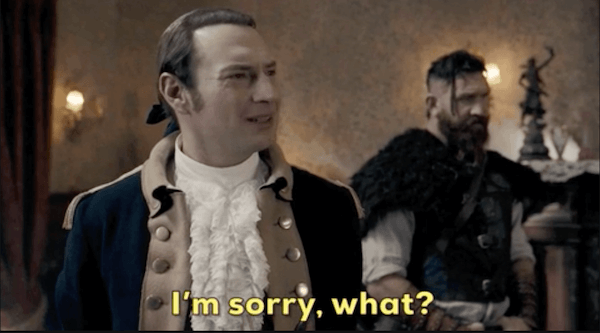
Nope.
Our company mission is to organize the world’s information and make it universally accessible and useful.
This, my friends, is conversational copywriting. And it’s what your audience wants. In your emails, ads, landing pages, website, and more. So read on to find out:
- What is conversational tone?
- Why you should be using it in your marketing.
- How to write in conversational tone.
- 30+ awesome examples of conversational copywriting that works.
What is conversational tone?
Conversational tone is an informal style of writing. The word choice, sentence structure, and other elements give the effect that a human being (and not a business or a robot or a court judge) is chatting with (and not reciting a speech to) the reader (and not an audience).
While it is a more relaxed, more direct form of communication, conversational writing isn’t disrespectful, unprofessional, or careless. It’s meant to make the reader feel more connected to the writer. In fact, any business or brand—even lawyers and accountants—can (and should) use conversational tone in their marketing.

Why conversational tone?
The short answer? Because people like people. Some more than others, of course, but we are drawn to what we’re familiar with. Let’s unpack this a bit more:
- Connect with your audience. Conversational tone has more personality, allowing you to humanize your business and give your audience a tangible character to relate to. Sounding too professional can make you seem less inviting, even intimidating at times.
- Stronger, more memorable messaging. Complex words and choppy sentences are hard to read. Informal writing is more direct and it flows, enabling your readers to easily comprehend—and store—the information.
- Earn trust. According to copywriting psychology, the easier it is to read something, the truer we perceive it to be. This happens on a subconscious level, but it’s also pretty obvious when someone is using fancy words just to sound smart.
- It’s inclusive. Simple language ensures that anyone can access and benefit from your content.
- It helps with SEO. Conversational writing uses the words and phrases your audience uses, which in the SEO world, are keywords. The more your content uses their language, the more likely it is to show up in search results.
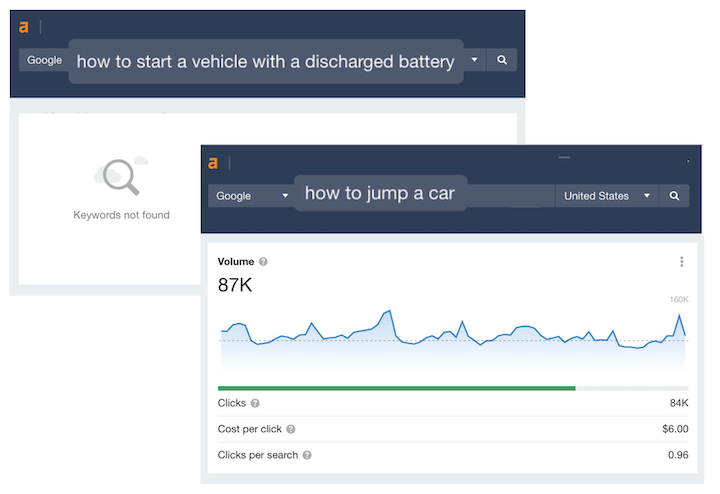
How to write in conversational tone
The idea you’re going for here is approachable expert.
Professional pal.
Friendly faculty.
Likable la—I’ll cut myself off here. You get the point. There are all kinds of tactics to use, depending on just how conversational you want to be.
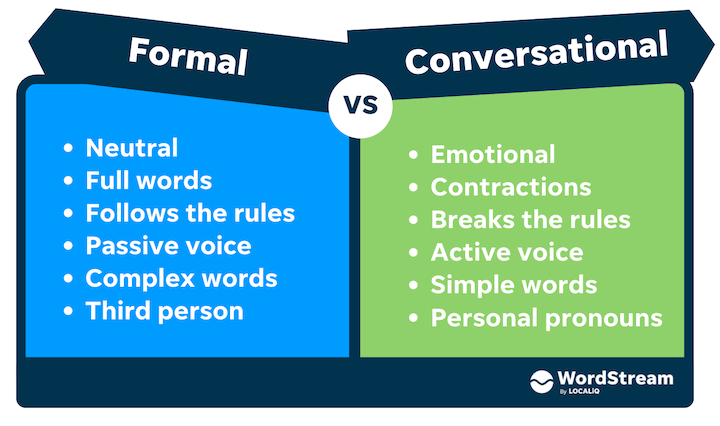
Here’s how to write in conversational tone:
- Use contractions. The apostrophe is your friend here.
❌ If you are looking to track leads, it is a best practice to use a CRM.
✅ If you’re looking to track leads, it’s a best practice to use a CRM. - Use active voice.
❌ It’s a best practice to use a CRM.
✅ We recommend you use a CRM. - Use plain language.
❌ We will assist you with your request.
✅ We’ll help you. - Use personal pronouns. “you”
❌ For advertisers looking to save money, monthly audits are recommended.
✅ If you want to save money, we recommend auditing your account monthly.
Here’s how to write in really conversational tone:
- Use parentheses to add side notes.
You can find it all in our free (and award-winning!) app. - Relax (or abandon) grammar. Do it. Start sentences with “and” or “but” 😶 . Write incomplete or one-word sentences 😮 . Make up words that don’t even exist 😱 . It’s liberating, I tell ya.
- Ask questions. Questions your readers are likely asking themselves is a good way to relate to the reader. You can also ask questions like “See what I mean?” and “Don’t you think?”
- Use bucket brigades. This copywriting technique uses conversational bridge phrases that keep your reader glued to your content.
- Here’s the deal
- Sounds good, right?
- Still not convinced?
- Now you’re probably wondering
- Here’s another thing.
- And the best part?
- Here’s the kicker
- What does that mean for you?
- Long story short
- Truth is
- I’ll show you what I mean
- Add emotion. Formal tone is neutral or serious….aka boring. Be funny. Be relatable. Express your frustration with something. Put passion behind your writing. Use emotional words.
- Use slang. It’s important to note here that jargon, slang, colloquialisms, idioms and the like can sometimes be offensive or not inclusive, so make sure you know your audience and always have a second pair of eyes review your conversational content.
- Spell it like it sounds.
Whaddaya think? It’s gotta be juuust right.
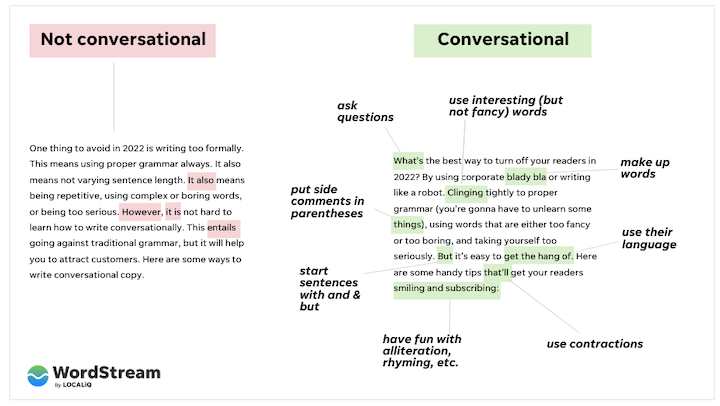
Excellent examples of conversational copywriting
Now that we’ve nailed down how to write in an informal, approachable style, let’s look at some examples.
Unbounce’s email
In this email copy for a content download, Unbounce’s conversational tone has you feeling like a friend is sharing this report. It reads:
But sometimes their campaigns can use a liiittle more science…Hey, we feel that. Getting your hands on data-validated insights is tough for a whole bunch of reasons.
That’s why we created the Conversion Benchmark Intelligence report—to help you start workin’ with Conversion Intelligence. As an agency marketer, this report should be your jam. It’s slam-packed with all-new insights…
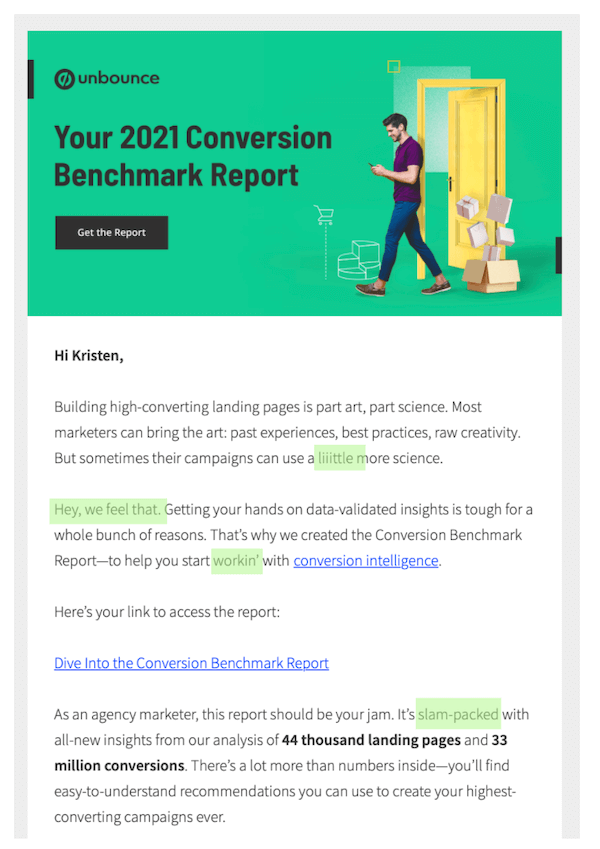
We also see conversational tone in its website copy, such as with:
(Yep, that means more leads, sales, and signups.)
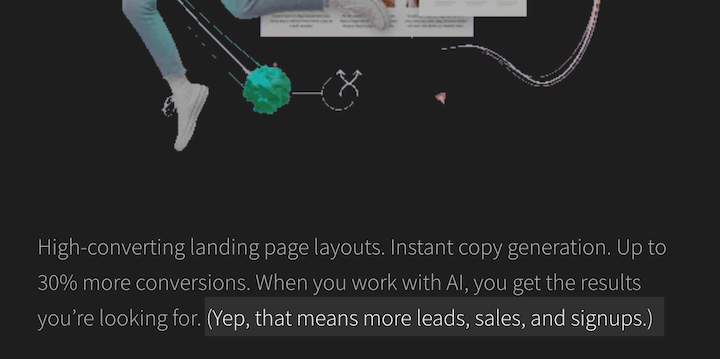
Search Engine Journals’ email opt-out
Conversational doesn’t have to mean playful. SEJ has a pretty informative tone as you can expect from an industry publication site, but at the bottom of its emails, we read:
Because you signed up for our email newsletter…we sometimes send sponsored emails to help keep the engine running. We won’t bombard you with spam and we never share your email address with our advertisers.
And then before the opt-out text, it reads:
Inbox overwhelm?
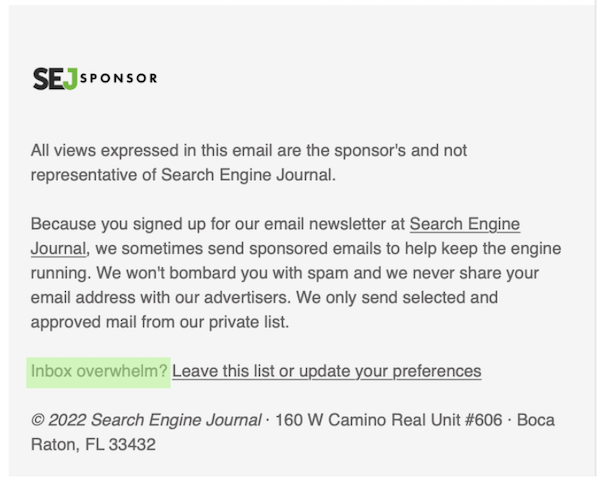
B2Linked’s homepage headline
B2Linked has an awesome headline on its homepage. Instead of something formal like “We run LinkedIn ads that outperform Facebook,” it reads: LinkedIn ads that outperform Facebook? Yep!
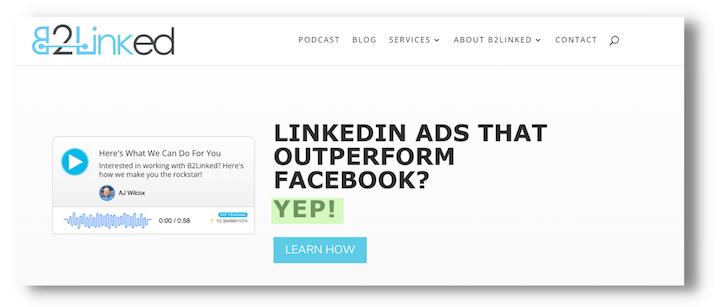
Hey B2Linked…
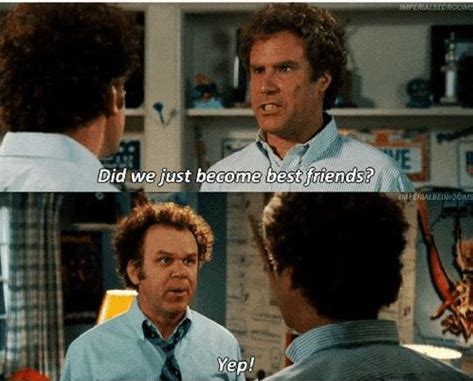
Talkroute’s 404 page
The best 404 pages are the funny ones. Nothing’s worse than seeing an ugly, serious message when you’re trying to access a page. In this example by Talkroute, we read:
Oops! You blew up the Internet. The page you are looking for is no longer here, or never existed in the first place (bummer). You can try searching for what you are looking for using the form below.
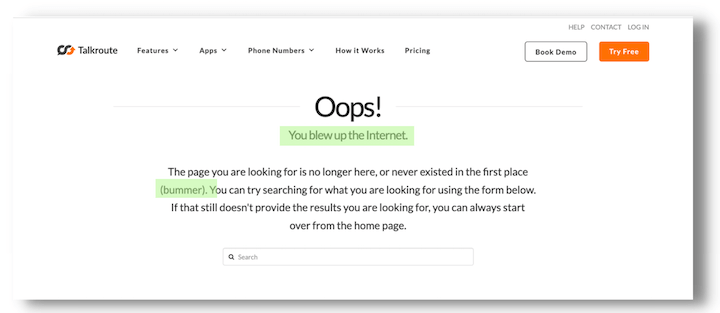
99design’s email signup CTA
Here’s an example of those little asides that give a conversational feel to your copy. This email newsletter signup CTA from 99designs says:
Want design tips & business trends (and the occasional promotion) in your inbox?
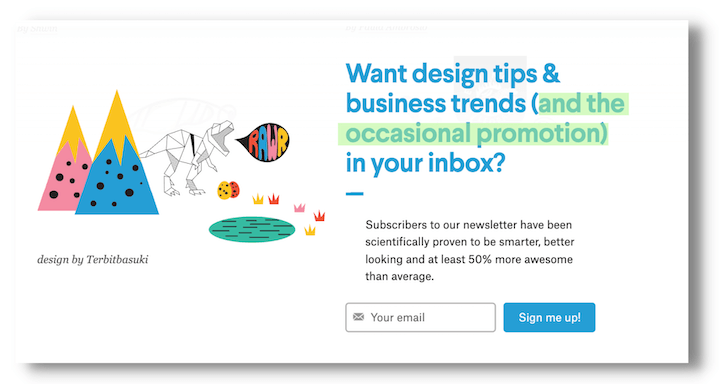 I’d also like to direct your attention to the conversational “rawr” coming out of the T-rex’s mouth.
I’d also like to direct your attention to the conversational “rawr” coming out of the T-rex’s mouth.
Sofi’s Facebook ad
Sofi’s website is somewhat conversational in general, but its Facebook ad copy is most relatable. It reads:
SoFi Personal Loans have no origination fees, no pre-payment fees, and no shady hidden fees…(Yes, you read that right.)
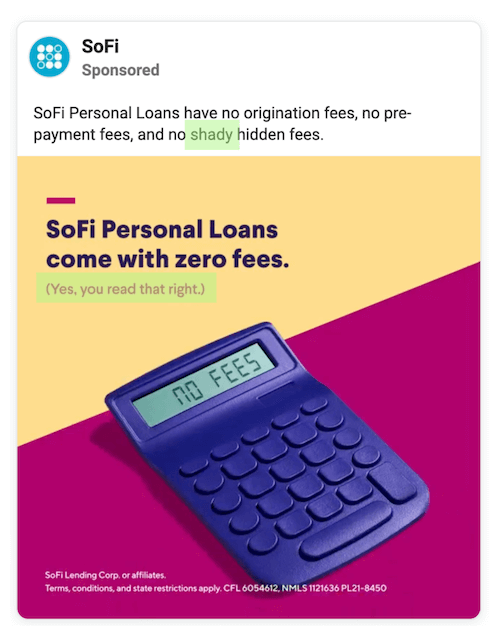
You can find more conversational ad copy in our Facebook ad examples.
This chatbot greeting
I enjoy this example. For a chatbot greeting at the bottom right of a website homepage, we see:
☝️ Down here, can I ask you a quick question?
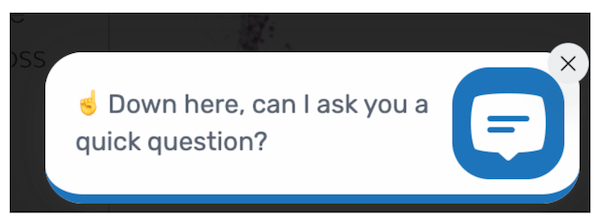
It’s just…cute.
The Clikk’s newsletter signup
The Clikk gets clever here with its signup copy. It reads:
A free daily newsletter from your smart ass friends in digital business. [With ass is in strikethrough font.]
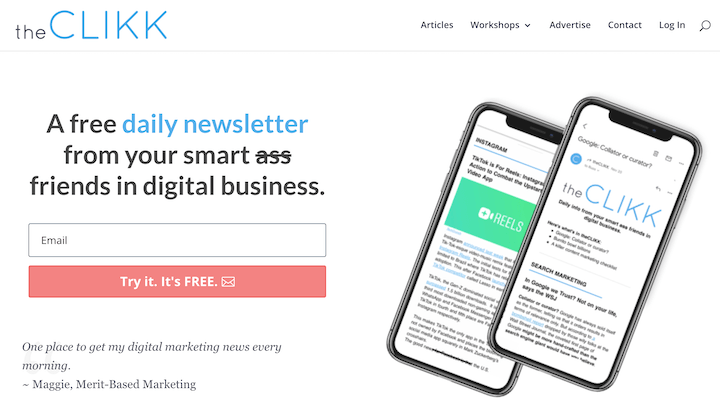
Cypress North’s about page
As mentioned above, conversational tone feels more trustworthy because of its direct nature. Cypress North describes this perfectly when talking about its core value of being always forthright:
We don’t beat around the bush. We don’t keep you in the dark. We maintain an open line of communication and involve or clients at every turn.
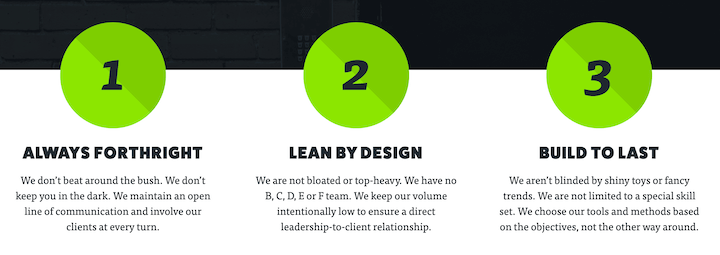
And it stays true to this value. For example, the other values read:
- Lean by design: We are not bloated or top-heavy. We have no B, C, D, E or F team. We keep our volume intentionally low to ensure a direct leadership-to-client relationship.
- Build to last: We aren’t blinded by shiny toys or fancy trends. We are not limited to a special skill set. We choose our tools and methods based on the objectives, not the other way around.
Another fun piece of copy?
We create. We develop. We market. For web, mobile…really anything with zeros and ones.

Oh and one more thing. The cityscape with the little annotations of We love our city and We live here but we work everywhere.

Big fan, Cypress North…big fan.
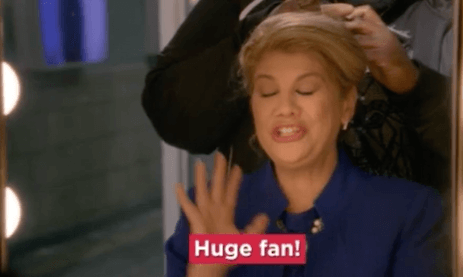
Hideaway’s blog post title
Here’s another way to write conversationally—using symbols and font styles to emphasize a particular word. In the example below, the title of the blog post is 14 Designer-Loved Hacks That Only *Look* Expensive.
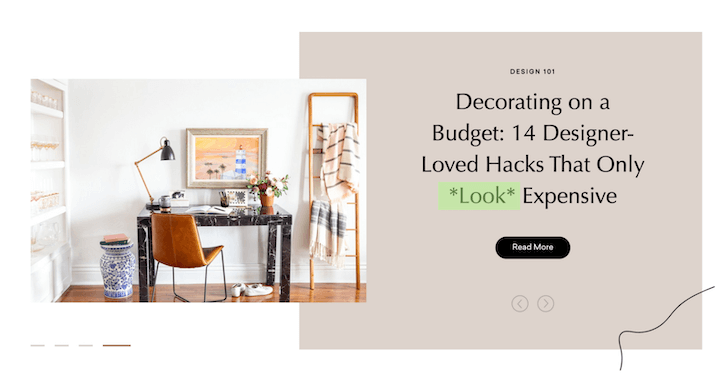
Asterisks feel more conversational than italics, don’t you think?
MarketingProfs’ pop-up
An organization with Ann Handley as the Chief Content Officer is bound to have impressive copywriting. In this email signup popup, the title immediately grabs your attention with WHOAH! Hold on a minute, friend.
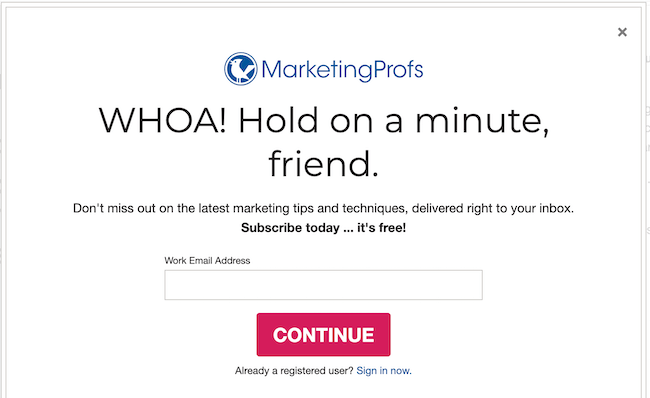
Brands with conversational brand identity
Some businesses use conversational tone in certain types or aspects of their content. Others incorporate conversational tone into their brand identity.
Basement’s entire website
Take Basement, for example. Let’s start with its appearance on the SERP:
Our work is serious, we are not
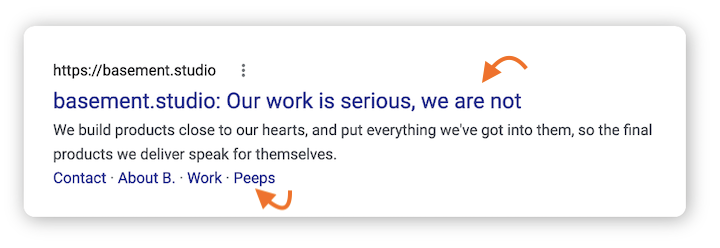 Moving on to its homepage, Basement calls itself a digital studio making cool shit that performs.
Moving on to its homepage, Basement calls itself a digital studio making cool shit that performs.
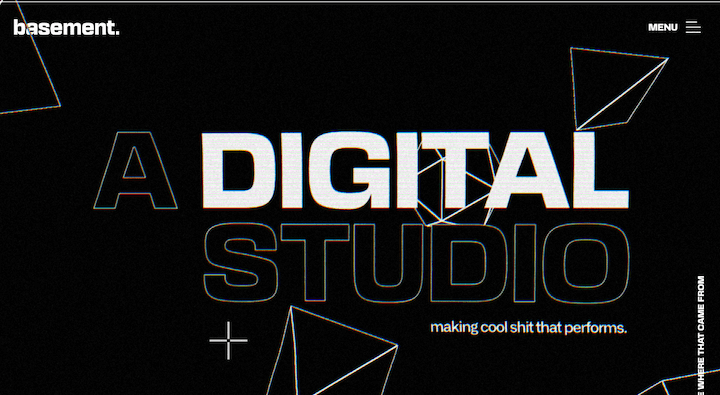
Then in its “what we do” section, we read:
Been there, done that. From basic Kanban to full-fledged AGILE teams, we’ve got to a point that allows us to adapt to your team, and we’re proud to say this is our best feature.
We lead, we advise, or we just build the thing, it depends on you and the role you want us to take in your project.
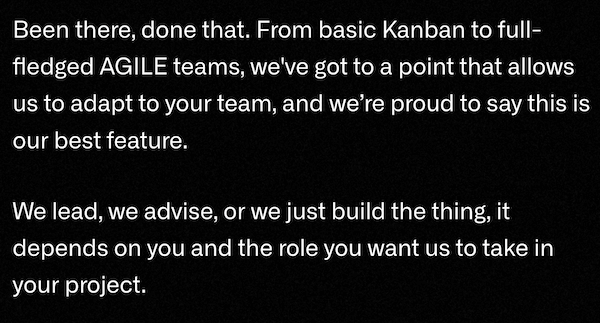
Copywriting tip: In these more extreme examples of informal, casual tone, it’s important to be all-in like Basement is. Fully embrace it and use it everywhere so that no one element feels out of place or lacking in taste.
Really Good Emails’ event invite
Really Good Emails is… really good at informal (and funny) copywriting. Take a look at this email invite for its UNSPAM Conference:
We understand if you like going to meetings in boring, ugly cities. We understand if you like crowded conferences where speakers pitch you an expensive software solution instead of useful knowledge. We understand if you like to spend more money on an entry ticket than you do on your mortgage.
But if you’re not into all of that, then RGE’s UNSPAM Conference is exactly your kinda thing…and tickets are now officially on sale for our first event.
Then it finishes off with a fun call to action phrase:
Get yo’ tickets while they’re hot.
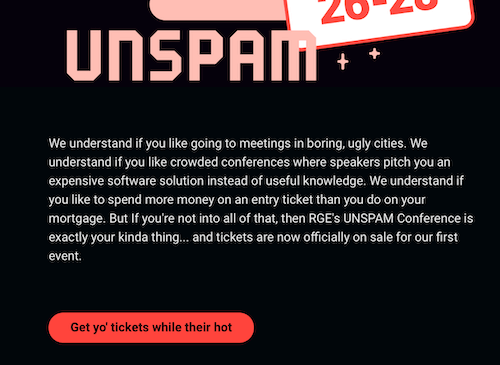
Lunchbox.io
As you can see right off the bat, Lunchbox has a playful and loud brand style. Upon arriving on its site, you get a cookie notification that reads:
You only have to do this once so let’s get this over with
We use cookies to make Lunchbox’s website the best in the food tech game. To learn more about our cookies, check out our Privacy Policy.
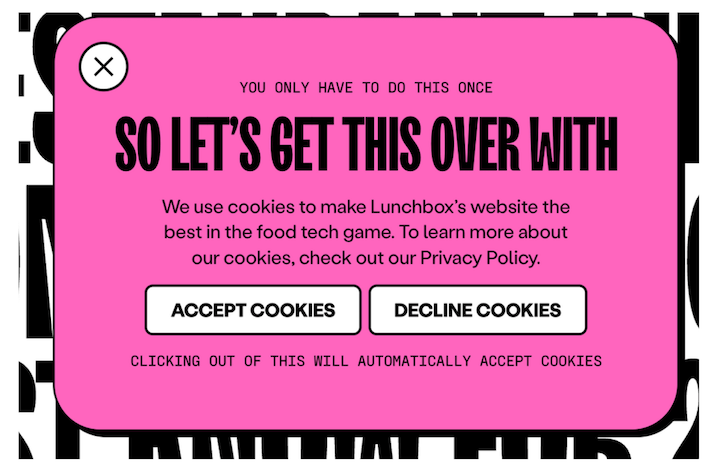
And then once you accept, you can tour a boatload of fun, slangy, engaging content.
Hook your customers up with food perks, cash perks, and all the perks you can imagine to keep ’em coming back. After all, the fastest way to their hearts is through their stomachs (and wallets).
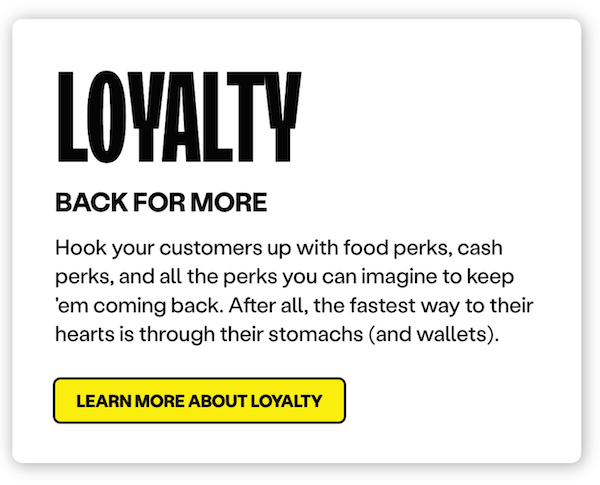
Fibery
Here’s another conversational brand. Fibery’s website is full of fun-to-read copywriting. In its FAQ page, instead of including a question like “What is the free year for startups offer?” it writes What about this free year for startups? in a voice-of-skeptical-customer kind of way.
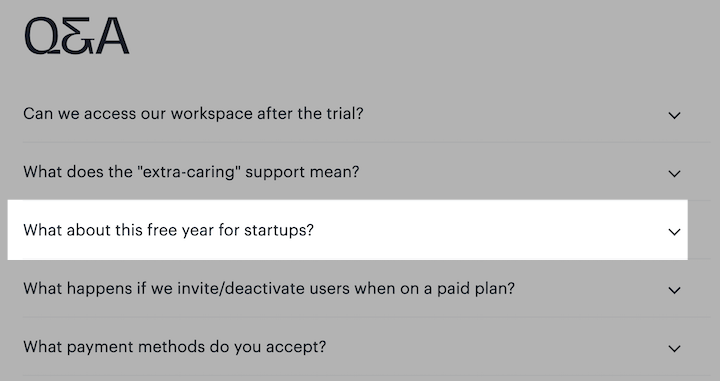
In a second example, it explains what you can do with the platform which includes building spaces for your processes, reflecting your company culture, and creating de-eee-ep work hierarchies.
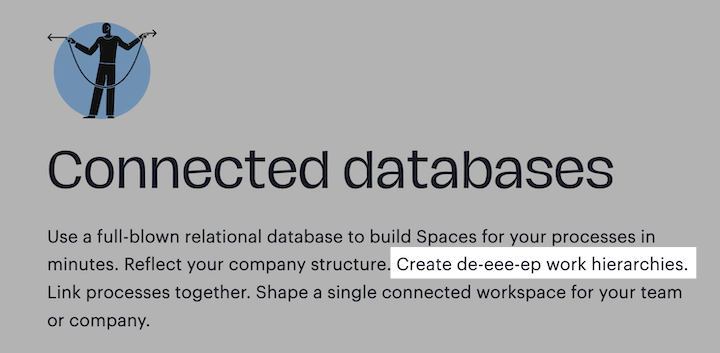
And then we have emojis…

abbreviations…
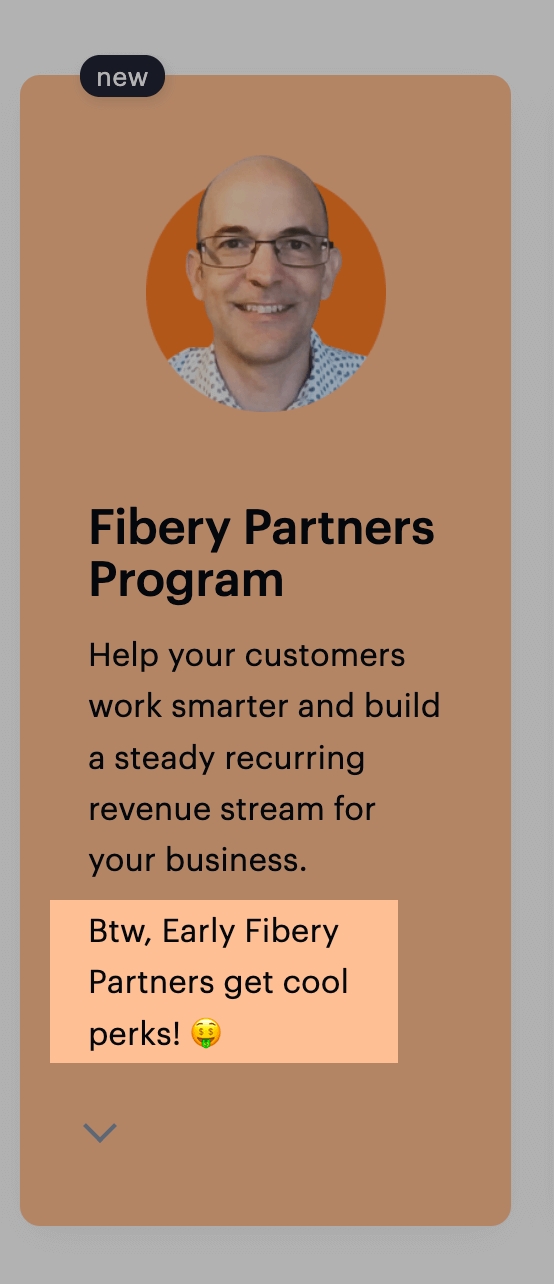
…and more. Excellent conversational copywriting! Good talk guys.
Allyens
As a brand whose mission is to make society more inclusive, you can bet that Allyens’ website copy will be conversational. Here we see plain language and then the bucket brigade of Guess what?
Allyens has been around for five years. That’s five years of hard work, of making society more inclusive, of breaking stereotypes, of making communications more accessible, and of bringing people together. Guess what? That’s exactly what we plan on doing the following five years and more.
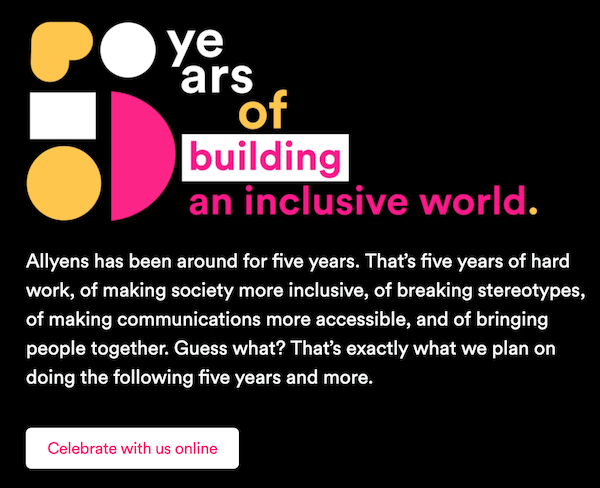
With the little asides like (yes, we do have our grump moments) phonetic spellings like fi-nal-ly and creative language like nag and grumble, you find yourself wanting to read more.
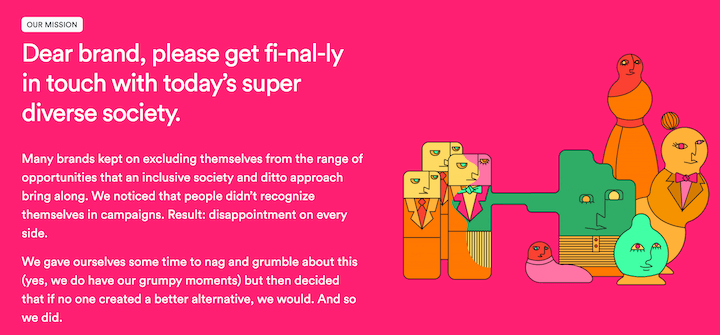
InGoodCo
InGoodCo’s website is a casual, conversational delight. Here are just two examples.
In its footer, instead of Certifications, Contact us, and Social, it labels its sections with We’re purposeful, We like hellos, and We get social.

Then in it’s newsletter signup, instead of something boring like To stay up to date on the latest news, sign up for our email, it reads:
Want to know when it all goes down? Get on the list!

Stryve
Aside from lots of engaging but not distracting movement (a website design trend), we see approachable copywriting throughout Stryve’s site. In one section, it “interrupts” its voice-of-the-customer statement:
The perfect candidate does not exi…
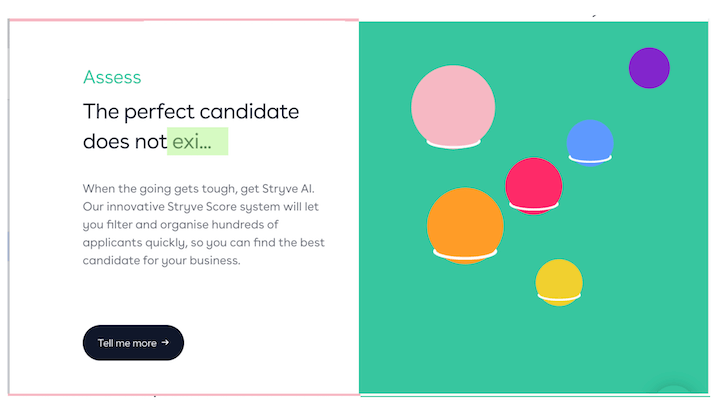
We also see little side notes in green boxes throughout the site with playful language.
GDPR…nailed it!
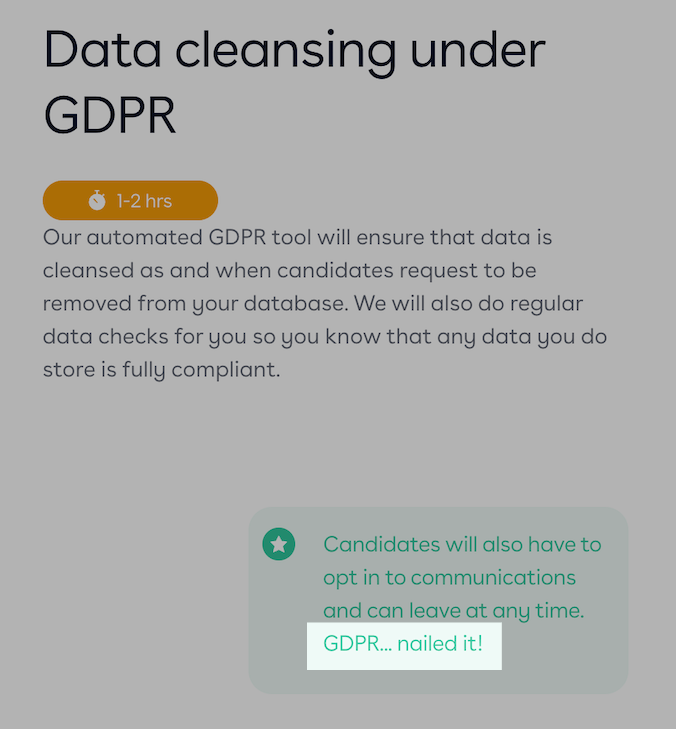
Conversational tone: get on it
Whether it’s an ad, landing page, homepage, social post, or more, check to see if any of your copy could use a conversational facelift. You can always A/B test one version against the other. The bottom line? Don’t take yourself too seriously. Loosen up the reigns a bit and see what comes to mind!


0 Comments